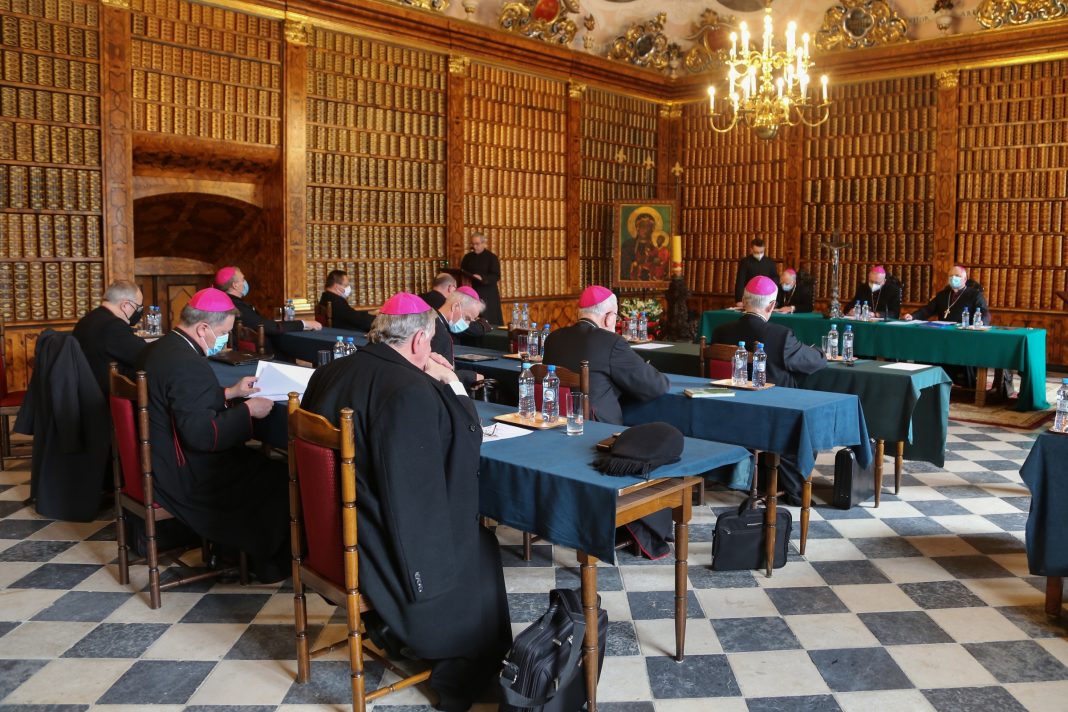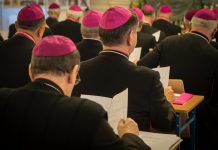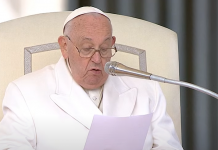Current pastoral issues of the Church in Poland in the time of pandemic, the beatification of Cardinal Stefan Wyszynski, the topic of language used in public debate and social life, and the issue of spiritual discourse in the media – These are the main topics discussed by the Permanent Council of the Polish Bishops’ Conference at its meeting on May 3rd of this year at Jasna Gora.
The bishops expressed their gratitude to Pope Francis for having announced the date of Cardinal Wyszynski’s beatification. They invited the faithful throughout the country to prepare for this ceremony, so that it may become an opportunity to recall and deepen his teaching. They pointed out that the figure of the Primate of the Millennium “can be an inspiration today for those who desire social reconciliation and the universal good, as well as respect for the right of believers to freely practice and publicly profess their faith in our country.”
The Permanent Council examined the pastoral situation of the Church in the time of the pandemic and the resulting pastoral challenges. “The pandemic has manifested the limits of human autonomy and the challenges facing pastoral activity,” the bishops wrote in the Communiqué. “It is, therefore, necessary to analyze the current situation very carefully and to recognize already today the possible consequences of the pandemic in Polish dioceses. The concern of pastors will therefore be to prepare the Church for the time after the pandemic,” the bishops noted, adding that this topic will be more widely reflected on at the next Plenary Assembly.
The bishops also addressed the subject of the language used in public debate and social life. They recalled that Pope Francis has repeatedly pointed out the importance of so-called inclusive language, especially in the face of growing divisions, verbal aggression, hate language, and exclusionary actions. “The bishops, recognizing that these phenomena have become a part of social life in Poland, encourage the Council for Social Affairs of the Polish Bishops’ Conference to prepare a document emphasizing the need to take steps to foster mutual understanding, sooth conflicts, and bridge existing divisions,” says the Communiqué.
The last issue discussed by the bishops concerned appearances of clerics in the media, especially certain public statements that are not always fully in line with Church’s doctrine. In this regard, the Permanent Council proposed, among other things, the revision and updating of the current “Norms of the Polish Bishops’ Conference concerning the appearances of clergy and religious and the transmission of the Christian doctrine in radio and television programs.”
The meeting of the Permanent Council was preceded by the Eucharist on the ramparts of Jasna Góra, presided over by Archbishop Stanisław Gądecki, President of the Polish Bishops’ Conference, during which prayers were offered through the intercession of Mary for social peace in our homeland and the cessation of the pandemic.
Press Office of the Polish Bishops’ Conference
We are publishing the full text of the Communiqué:
COMMUNIQUÉ
OF THE PERMANENT COUNCIL OF THE POLISH BISHOPS’ CONFERENCE
AFTER THE MEETING AT JASNA GÓRA ON 3 MAY 2021
On 3 May 2021, the Solemnity of the Blessed Virgin Mary Queen of Poland, the Permanent Council of the Polish Bishops’ Conference met at Jasna Góra. The meeting was devoted to current pastoral issues of the Church in our country in the time of the continuing coronavirus pandemic.
- The meeting of the Permanent Council was preceded by a Solemn Eucharist on the ramparts of Jasna Góra, concelebrated by bishops and priests under the presidency of Archbishop Stanisław Gądecki, the President of the Polish Bishops’ Conference, who gave the homily. During the Mass, people prayed, through the intercession of Mary, for social peace in our homeland, for the cessation of the coronavirus pandemic, for the pilgrims to Our Lady of Czestochowa, and for all the intentions entrusted to the Queen of Poland by our compatriots.
- The bishops expressed their gratitude to Pope Francis for having announced the date of the beatification of the Primate of the Millennium, Cardinal Stefan Wyszynski. They invited the faithful throughout the country to prepare for this ceremony, which will take place on September 12th, so that it may become an opportunity to recall and deepen the teaching of this great Pole. They pointed out that his figure, so strongly inscribed in the extremely difficult times of our homeland, can be an inspiration today for those who desire social reconciliation and the universal good, as well as respect for the right of believers to freely practice and publicly profess their faith in our country.
- The Permanent Council also analyzed the pastoral situation of the Church that is resulting from the severe constraints of the pandemic and the subsequent pastoral challenges. The pandemic has manifested the limits of human autonomy and the challenges facing pastoral activity. Pastors have noticed a weakening of the religious practice of the faithful. There are also problems such as the still difficult access of priests to the sick in many places, or the fact that the activity of some groups and movements is sometimes impossible. However, Pope Francis makes us aware during the time after the pandemic will not only dedicated to reviving actions of the past but will also require a new kind of action. It is, therefore, necessary to analyze the current situation very carefully and to recognize already today the possible consequences of the pandemic in Polish dioceses. The concern of pastors will therefore be to prepare the Church for the time after the pandemic. This topic will be more widely reflected on at the next Plenary Assembly.
- The bishops also addressed the topic of the language used in public debate and social life. In his teaching, Pope Francis has repeatedly pointed out the importance of the so-called inclusive language, especially in the face of growing divisions, verbal aggression, hate language, and exclusionary actions. The bishops, recognizing that these phenomena have become a part of social life in Poland, encourage the Council for Social Affairs of the Polish Bishops’ Conference to prepare a document emphasizing the need to take steps to foster mutual understanding, sooth conflicts, and bridge existing divisions.
- The bishops also discussed the appearances of clerics in the media, especially certain public statements that are not always fully in line with Church’s doctrine. The Permanent Council proposed, among other things, the revision and updating of the current “Norms of the Polish Bishops’ Conference concerning the appearances of clergy and religious and the transmission of the Christian doctrine in radio and television programs.” Since their enactment in 2004, there have been great changes in the media space, concerning mainly the Internet and social media platforms, which have a strong impact in society, especially on young people. The Permanent Council has appointed a team of experts to prepare an updated version of these norms.
The members of the Permanent Council embrace with solicitude and prayer all our Compatriots at home and abroad, and they give them their pastoral blessing from the spiritual capital of Poland.
The Permanent Council of the Polish Bishops’ Conference
3 May 2021
(translation from Polish: P. Nau / Office for Foreign Communication of the Polish Bishops’ Conference)

 English
English







